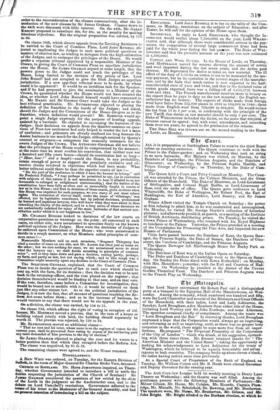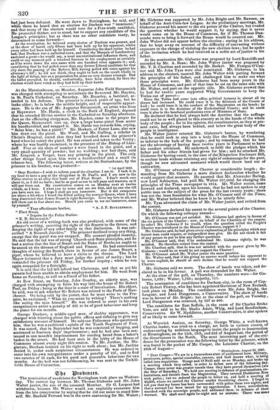Zbe inetropotis.
The Lord Mayor entertained Sir Robert Peel and a distinguished party at a banquet in the Egyptian Hall of the Mansionhouse, on Wed- nesday. Among the company, which numbered one hundred and •fifty, were the Lord Chancellor and several of the Ministers and Great Officers of the Household, with their ladies, Lord and Lady Ashburton, the Speaker, Lord Brougham, a few Members from either side of the House, including Lord Worsley and Sir John Eastbope, and some Aldermen. The speeches consisted chiefly of compliment. Among the toasts was " Lord Brougham and the Bar." In returning thanks, Lord Brougham expressed a hope that the Corporation would always go on improving. and reforming as well as improving, until, as there was no greater body corporate in the world, there might be none more free from all imper- fections. He proposed " The Perpetual Prosperity of the Corporation of the City of London "; which was drunk, at his suggestion, upstand- ing, with three times three. Mr. Everett returned thanks for " The American Minister and the United States"; taking the opportunity of making his acknowledgments to Lord Ashburton for the treaty of Washington, which he believed to be equally honourable and advan Lagoons to both countries. The company broke up about eleven &clock; the ladies having retired some time previously.
At a Special Court of Proprietors of the Bank of England, on Tuesday, Mr. William Cotton and Mr. B. Heath were elected Governor and Deputy Governor for the ensuing year.
The Anti-Corn-law League held its weekly meeting in Drury Lane Theatre on Wednesday ; and the theatre was well filled. Among the gentlemen present were the following Members of Parliament—Mr. Milner Gibson; Mr. Hume, Mr. Cobden, Mr. Ricardo, Captain Plum- ridge, Mr. Mitcalfe, Mr. Scholefield, Dr. Bowring, and Mr. Brotherton. The speakers were, Mr. Hume, Mr. Brotherton, Mr. Gibson, and Mr. John•Bright. Mr. Bright alluded to the Durham election, at which he
bad just been defeated. He went down to Nottingham, he said, and while there he heard that an election for Durham was " imminent," and that many of the electors would vote for a Free-trade candidate. He proceeded thither, not to stand, but to support any candidate of the League's principles; but as there was no other candidate ready, he determined to come forward— At the nomination, he believed every elector of Durham was present, and at the show of bands only fifteen had been held up for his opponent, whilst every other had been held up for himself. Considering the short notice he bad had, that Durham was a cathedral town, and that the Marquis of Londonderry exercised a great—be would say, a most unconstitutional influence there, and could at any moment poll a hundred freemen in bis employment as certainly as if he wrote down his own name with one hundred votes opposite it ; and, considering that be had polled more than any former Liberal candidate for that city since the passing of the Reform Bill, having polled 406 votes against his adversary's 507; he did not think, they ought to look on the result wholly in the light of defeat, but as a preparation for some no very distant triumph. Had the ballot prevailed, be should, undoubtedly, have been elected, for then the electors would have voted as they had held up their hands.
At the Mansionbouse, on Monday, Augustus John Field Sintzennich was charged with attempting to assassinate the Reverend Mr. Hay den, in St. Paul's Cathedral, on Saturday. Mr. Bryarley, a barrister, at- tended in his defence. The prisoner is sixteen years of age, but he looks older ; he is below the middle height, and of respectable appear- ance. He is the son of Mr. Augustus Sintzennich, an artist who lives at Bayswater. Mr. Harde, a clerk in the Bank of England, deposed that he attended Divine service in the Cathedral on Saturday afternoon. Just as the officiating clergyman, Mr. Hayden, came to the prayer for the Queen, Sintzennich rose up, drew a large horse-pistol from under his handkerchief, and snapped it. Mr. Harde ran towards him, crying, " Seize him ; he has a pistol !" Mr. Heskett, of Fetter Lane, also saw him draw out the pistol. Mr. Wood, and Mr. Gulling, a scholar in Christ's Hospital, stated that they had knocked down the prisoner's hand when he raised the pistol. He was seized and taken to the Vestry; where he was hastily examined, in the presence of the Bishop of Llan- daff. Five or six shots of number 4 were found in the pistol, and a very small quantity of powder; but no wadding ; nor bad there, said Mr. Lingard, a Verger, been any priming in the pistol. The only other things found upon him were a handkerchief and a small tin tobacco-box. The follow ing letter, written at the Stationhouse, by the prisoner to his brother, was produced- " 1st April 1843.
" Dear Brother—I wish to inform you of the situation I am in. 1 took it in my head to have a pop at the clergyman in St. Paul's, and I am now in the Police-station in an alley that leads out of Fleet Street. I don't much care about it, as I did no harm ; but be so good as not to tell papa and mamma, as it will put them out. My examination comes on on Monday next at twelve o'clock, as I hear. I want you to come and see me first, and no one else till you have seen me. I hope I shall see you tomorrow. But it did exasperate me above a bit when I heard the fellow calling the usurper Queen, when 1 have long discovered that James Stuart is right Sovereign. Give my love to all, and tell them not to fear about me. Should you come to see me tomorrow, come by yourself.
" Your affectionate brother, " A. J. F. SINTZENNICFI.
"Fleet Street.
" Inquire for the Police Station.
"E. N. Sintxennich."
An old cover of a writing-book was also produced, with some of the prisoner's writing, asserting the right of the Stuarts to the throne, and denying the right of any other family to that distinction. It was sub- scribed " A Staunch Jacobite." The prisoner declined to say any thing, except that the pistol was not snapped. His counsel pleaded insanity. He said that the lad was of strong Church-and-State principles, and he had a notion that the line of Stuart and the Duke of Bordeaux ought to be seated on the thrones of England and France. He had entertained thoughts of raising the Scotch clans in favour of one James Stuart, a piper, whom he believed to have a claim to the throne. The Lord Mayor intimated that a Jury must judge the point of sanity ; but he remanded the prisoner till Friday, for further inquiry ; when he was again remanded for a fortnight. It is said that the lad left school last Christmas, and that as yet his parents had been unable to obtain employment for him. He went from home on Saturday, to call on a friend of his father.
At Bow Street, on Saturday, John Goatley, an elderly man, was
charged with attempting to force his way into the house of Sir Robert Peel, on Friday ; being at the time in a state of intoxication. His object, he said, was to ask whether Sir Robert was related to the Peels of Man- chester. On being told by the porter, that he must write to the Pre- mier, he exclaimed, " What do you mean by writing ? There's nothing like seeing the man himself." He was ordered to enter in his own recognizances under a penalty of 201. to be of good behaviour and keep the peace for six months.
George Denham, a middle-aged man, of shabby appearance, was
charged with loitering about the public offices and refusing to give any satisfactory account of himself. He told one Policeman who questioned him, that be was a cashiered t. aptain of the Tenth Regiment of Foot. It was stated, that in September last be was convicted of begging, and sentenced to fourteen days' imprisonment ; and he had also been sen- tenced to one mouth's imprisonment for stealing bread from a baker's basket in the street. He had been seen in the lobby of the House of Commons almost every night this session. To Mr. Jardine, the Ma- gistrate, Denham insisted on his right to walk about ; but Mr. Jardine denied it, under such suspicious circumstances. He was ordered to enter into his own recognizances under a penalty of 101., and to find two sureties of Si, each, for his good and peaceable behaviour for two months. As the bail was not forthcoming, he was sent to the Tothill- fields House of Correction.



























 Previous page
Previous page